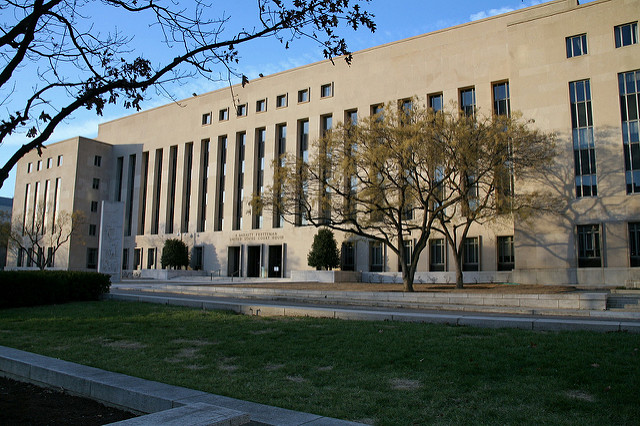The D.C. Circuit Affirms in Doe v. Mattis: No Transfer of a U.S. Citizen Detainee to Saudi Custody
On Monday, we learned that a divided panel of the U.S. Court of Appeals for the D.C. Circuit has sided with the ACLU on the question whether the U.S. government can involuntarily transfer John Doe, a dual U.S.-Saudi citizen whom U.S. forces have held as an enemy combatant in Iraq since last September.

Published by The Lawfare Institute
in Cooperation With

On Monday, we learned that a divided panel of the U.S. Court of Appeals for the D.C. Circuit has sided with the ACLU on the question whether the U.S. government can involuntarily transfer John Doe, a dual U.S.-Saudi citizen whom U.S. forces have held as an enemy combatant in Iraq since last September. None of us have seen the dueling opinions yet (a majority opinion by Judge Sri Srinivasan, joined by Judge Robert Wilkins, and a dissent by Judge Karen LeCraft Henderson), so it is too soon to dig into the merits of the ruling. Still, we can say the following:
- We can expect the government not to want to leave things here. And so the question becomes: seek en banc review from the full Circuit, or move directly to a cert petition? Much depends on precisely what the majority wrote, but it does seem likely to me that this one will go all the way up to the Supreme Court. Unless, of course, the case somehow gets mooted in the meantime. How might that happen?
- It could be that the opinion will preclude this possibility, but bear in mind the possibility that in barring transfer to Saudi Arabia, the ruling will leave open the option of doing precisely what John Doe’s habeas petition originally requested: just releasing him. In practical terms, this presumably would involve Doe walking free somewhere in the Kurdish region of Iraq. Might Kurdish authorities then snatch him up and ship him off to Saudi Arabia? No doubt the ACLU is pondering this possibility and how to protect against it. It will be interesting to see if the majority’s opinion touches on it in any way; if I’m not mistaken, a question references something along these lines did come up in the oral argument.
- Assuming that Doe does end up simply staying in U.S. custody for some time to come, what next? Glad you asked: the merits of the U.S. government’s legal claim to detain Doe have been fully briefed, and are awaiting further action by Judge Tanya Chutkan at the district court. Unless and until higher authority says otherwise, Chutkan should proceed to the merits with dispatch. After all, that ruling won’t be the last word; you can count on an appeal whichever way it goes. For a primer on those legal issues, see this post.
- Don’t forget, too, that ACLU for the moment is only pressing Doe’s legal claim on the merits. If and when that runs its course and favors the government, presumably then we’ll have litigation over the sufficiency of the evidence. For a primer on those evidentiary issues, see this post.
- Meanwhile, what should you look for when the D.C. Circuit’s opinion does become public?
- Will the majority approach the transfer question as if it somehow depends on the (should-be) distinct issue of whether the government has legal authority to detain Doe as an enemy combatant in the first place? I hope not; those questions should be kept separate. But the oral argument had lots of discussion of the possibility. Sigh…
- Will the opinion instead focus, as it should be, simply on whether to extend Munaf to this situation or instead to just apply Valentine? That, to me, is the important question, and if I had to bet I’d say that the key passage will turn out to be a section distinguishing Munaf and then concluding that Valentine should be applied broadly.
Steve Vladeck and I will debate all of this in tomorrow’s National Security Law Podcast, so be sure to tune in for that. Meanwhile, here’s my most recent previous post on the transfer issue in Doe v. Mattis. Read it as a primer so you’ll be ready to assess the D.C. Circuit’s ruling once it becomes available.



.jpg?sfvrsn=d5e57b75_7)

